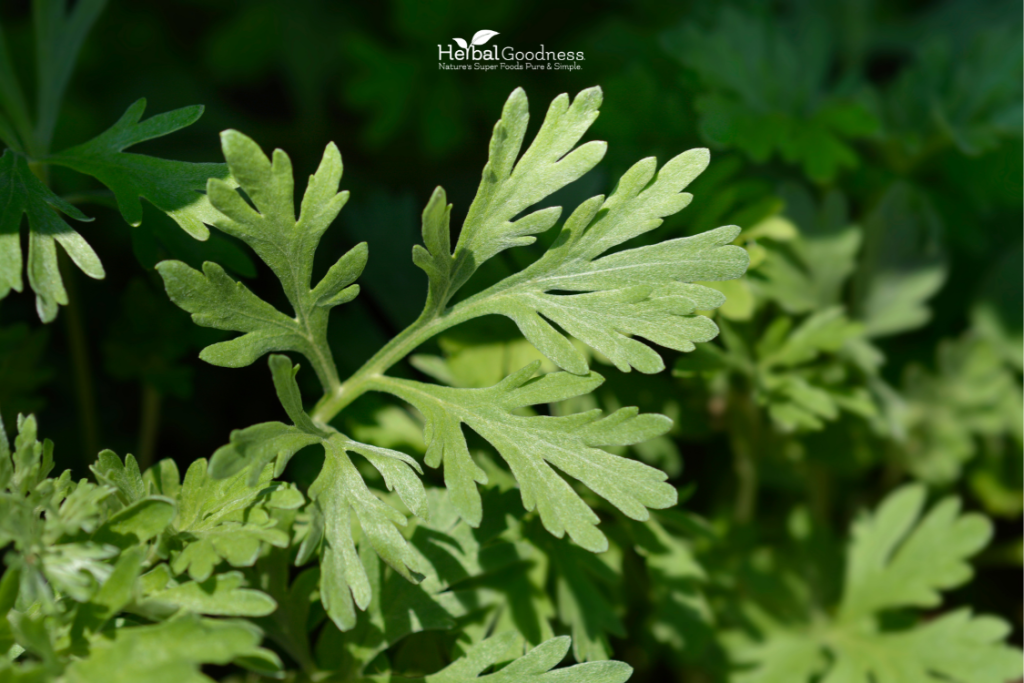
Wormwood is a herb that has been used for centuries for its medicinal and culinary properties. It is also known as artemisia absinthium, absinthe, or green ginger. This herb belongs to the daisy family and grows in temperate regions of Europe, Asia, and Africa. It has a bitter taste and a strong aroma that can repel insects and parasites.
Some Amazing Benefits of Wormwood
This herb has many health benefits that are backed by scientific research. Some of the most notable ones are:
1. Wormwood can help promote digestive health
It helps to stimulate the production of bile and gastric juices, which may help maintain a healthy appetite, and improve digestion. It can also help with conditions such as indigestion, dyspepsia, bloating, gas, and constipation.
2. It can boost liver health
Its anti-inflammatory and antioxidant properties may help protect the liver from damage and inflammation.
3. Wormwood supports a healthy gut
It has antimicrobial and antifungal properties which can boost the immune system and may help restore healthy flora. It can help support a healthy gut.
4. It can reduce pain and inflammation
Wormwood has anti-inflammatory properties that can help support the occasional joint discomfort everyone experiences from time to time. It can reduce the production of inflammatory chemicals. It can also be helpful in managing conditions such as arthritis, menstrual cramps, headaches, and muscle spasms.
5. Wormwood can improve mood and mental health
This amazing herb has neuroprotective and antidepressant properties that can help support calm and relaxation. It can modulate the levels of neurotransmitters such as serotonin, dopamine, and GABA. It can also be beneficial for mental disorders such as depression, anxiety, and insomnia.
How to Use Wormwood
Wormwood can be used in various ways, depending on the purpose and preference. Some of the most common ways are:
Tea: Steep dried wormwood leaves in hot water for about 10 minutes to make this tea. Sweeten with honey or sugar to mask the bitter taste. You can enjoy this tea up to three times a day, ideally before meals.
Tincture: You can create wormwood tincture by soaking the leaves in alcohol for approximately two weeks. Add a few drops into water or juice for consumption.
Capsules: Its capsules can be purchased from health food stores or online. They contain powdered wormwood leaves or extracts. These capsules can be taken according to the instructions on the label, usually one or two capsules a day, preferably before meals.
Oil: You can extract wormwood oil from its leaves through steam distillation and use it for aromatherapy, massage, or topical application. Dilute this essential oil with a carrier oil like olive or coconut oil before skin application. Additionally, you can add it to a diffuser or bath for inhalation purposes.
Precautions and Side Effects of Wormwood
Wormwood is generally safe and well-tolerated when used in moderation and for short periods. However, some precautions and side effects should be considered before using it:
Pregnancy and breastfeeding:
Wormwood should be avoided by pregnant and breastfeeding women, as it can stimulate uterine contractions and affect the milk supply. It can also pass into the breast milk and may harm the baby.
Allergy:
It can cause allergic reactions in some people, especially those who are allergic to plants in the daisy family. Symptoms of an allergic reaction may include rash, itching, swelling, difficulty breathing, and anaphylaxis.
Medication interaction
Wormwood can interact with some medications and affect their effectiveness or cause adverse effects. Some of the medications that can interact with it are anticoagulants, anticonvulsants, antidepressants, antidiabetics, antihypertensives, and antiretrovirals. If you are taking any medication, consult your doctor before using it.
Thujone toxicity.
Wormwood contains a chemical compound called thujone, which can have psychoactive and toxic effects in high doses or prolonged use. Thujone can cause seizures, hallucinations, kidney damage, liver damage, and death. Avoid using products that contain high amounts of thujone, such as absinthe, and limit its intake to no more than 10 grams per day.
Conclusion
Wormwood is a herb that can offer amazing health benefits for those who use it wisely and responsibly. It is a natural and effective way to improve your well-being and quality of life.
It has been used for centuries for its medicinal and culinary properties. Its numerous health benefits can help with digestive issues, liver health, infections, pain and inflammation, and mood and mental health.
You can actively use this amazing herb in several forms, including tea, tincture, capsules, or oil. However, exercise caution and moderation when using it due to potential precautions and side effects, such as those related to pregnancy and breastfeeding, allergies, medication interactions, and thujone toxicity. Consult your doctor before using wormwood if you have any medical condition or are taking any medication.
Sources
https://www.webmd.com/vitamins/ai/ingredientmono-729/wormwood


